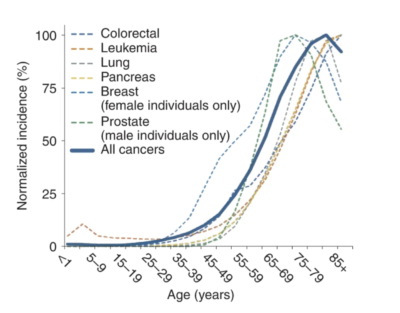1) Aging is the Primary Risk Factor for Cancer
Aging is the single most significant risk factor for cancer development. As we age, our cells undergo cumulative genetic changes and alterations in cellular processes, increasing the likelihood of cancer.
A comprehensive understanding of aging processes could offer invaluable insights into prevention, early detection, and better treatment strategies.

2) Prevention is Better Than Cure
Research on aging and cancer is not just about finding cures; it's also about understanding how we can prevent it in the first place. This information could lead to lifestyle and environmental changes that significantly lower the risk of developing cancer.

3) Identifying Biomarkers for Early Detection:
Early detection is often the key to successful cancer treatment. Through studying aging and cancer, we may identify potential biomarkers that could serve as early indicators of cancer development.
Such discoveries would revolutionize cancer screening, leading to more timely interventions and improved outcomes.

4) Paving the Way for Precision Medicine:
Insights gained from studying aging and cancer have the potential to revolutionize treatment, by targeting the underlying mechanisms of aging, such as cellular senescence. This research could lead to novel therapeutics.
Additionally, it could help develop precision medicine or tailored treatments by understanding the unique molecular and genetic signatures of individuals.

5) Aging and Cancer Research is Key to Enhancing Healthy Longevity
Aging and cancer research is not solely about prolonging life; it is about extending healthspan - the period of life spent free of disease, frailty, and disability.
By studying aging, we may unlock strategies to delay age-related diseases, enhance resilience, and promote healthier aging for a society with an increasing elderly population.

6) Addressing Disparities in Cancer Treatment for Older Adults is Crucial
Currently, there is a significant lack of funding and representation of older adults in clinical trials. This leads to disparities in cancer treatment.
Research into aging and cancer will contribute to more equitable and improved treatment strategies for older patients.

7) Aging and Cancer Research Can Reduce the Economic Burden of Disease
The economic cost of cancer treatment is enormous. Through improved prevention strategies, early detection capabilities, and better treatment, research on aging and cancer could significantly reduce the financial strain on individuals and global healthcare systems.
